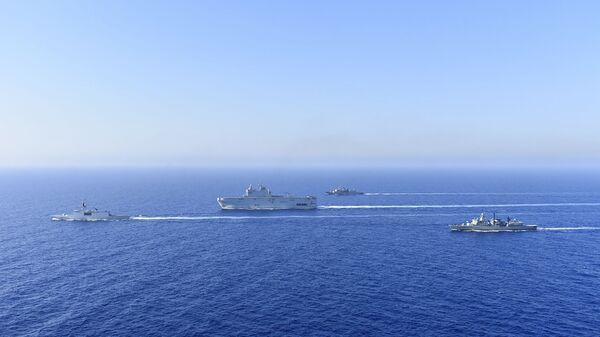Sputnik talked to experts to discuss the political and legal sides of the issue.
'Eastern Mediterranean is Turning Into Tinderbox'
Christian Fleury, French expert, Doctor of Geographical Sciences, member of the research group at the Espaces et Sociétés Can Centre of University of Can-Normandy, pointed out the complexity of the hydrocarbon production issue, particularly coordinating the scale of the work performed:
"Before embarking on offshore oil production, one has to define production limits in the sea and at the seabed, which further complicates the matter. These are preliminary questions that take a long time to resolve. For example, the longstanding US-Canada border dispute in the Beaufort Sea, where Washington and Ottawa are arguing over the area in the Arctic Ocean."
Christian Fleury doesn't rule out that the Mediterranean "might turn into a tinderbox" due to its geographic location and political realities.
"The situation in the Mediterranean is even more complicated. It is a closed or almost closed sea with an extremely indented coastline. There are many coastal countries, large and small islands in the region. The recent events (between Turkey and Greece) suggest that the situation could get worse. Sometimes insignificant events, for example, a plane flying over this or that territory, suddenly trigger tension."
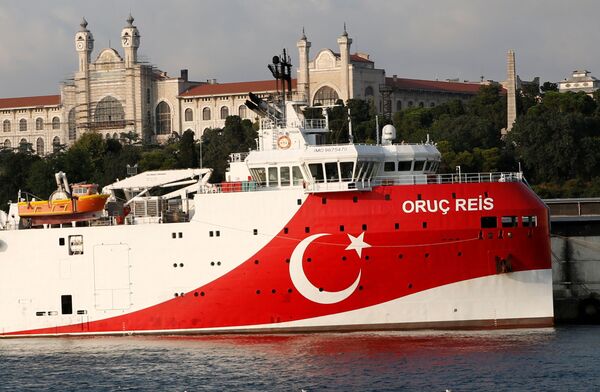
According to the French expert, one of the steps to resolve disputes between Turkey and Greece is to appeal to international courts:
"To resolve this conflict, Greece and Turkey should appeal to international courts. If these states don't reach an agreement, they should at least agree on bringing the matter to court. Canada and France did this in 1992, resolving the dispute over Saint-Pierre-et-Miquelon", Fleury said.
In turn, Aris Chatzistefanou, Greek expert, documentary filmmaker, founder of the Infowar portal, said that "the foreign policy of a country like Greece should be based on the impartial use of international law and good-neighbourly relations principles".
'Greece Should Respond Exclusively within International Law'
Criticising Turkey's policies in the region, Aris Chatzistefanou pointed to the country's reaction to similar actions by its neighbour:
"Instead of responding exclusively within international law, Greece prefers filling its TV airs with nationalist publicists who dream of capturing Constantinople and returning to the borders that existed before the Battle of Kütahya–Eskişehir. Instead of explaining to the citizens the existing rules of the game, they are telling stories about an infallible and constantly-offended-by-everyone Greece".
The expert stresses that the recent agreement between Greece and Egypt should be regarded as a sign that the countries of the region are capable of maintaining a dialogue and reaching agreements, but not as a signal to exacerbate the situation:
"The recent agreement between Greece and Egypt should at least show us that disagreements can be resolved through communication and concessions on both sides. Otherwise, with the help of distorted media lenses and government statements, it risks becoming a call to arms. According to what some pro-government analysts say on social media, the only indicator of our victory is the anger we provoke in our opponents."

"But those who are happy that Turkey is calling to break the Athens-Ankara negotiations simply don’t understand that we are at the beginning, not at the end, of a harsh confrontation. If disagreements aren’t resolved through understandings between parties (Turkey and Greece), they will be ‘resolved’ through the intervention of foreign embassies and oil companies", the Greek expert concluded.
'The Parties' Unilateral Actions Will Aggravate the Conflict'
Fernando Ríos, Spanish expert, Professor of Constitutional Law at University of La Laguna (Tenerife), warned Turkey and Greece against taking unilateral steps to resolve maritime border disputes:
"As long as there are disagreements over the ownership of the territorial waters, there should be no unilateral actions that could aggravate the conflict. In any case, when there is a dispute over territorial waters, it should be resolved either bilaterally or through appealing to international authorities to resolve the issue in the legal field."
Rios also pointed to Spain's territorial disputes with Morocco:
"Spain has territorial disputes with Morocco, both in Ceuta and Melilla, as well as in the Canary Islands or in Western Sahara; all of these territories are claimed by Morocco. There is a controversy regarding the ownership of waters between the Canary Islands, Morocco and the Sahara; Morocco put forward claims after Spain had carried out geological exploration off the coast of Fuerteventura y Lanzarote. There have been attempts to find a bilateral solution through dialogue; but today, it's impossible to resolve the problem, given the differences between the parties as to which waters belong to each state."
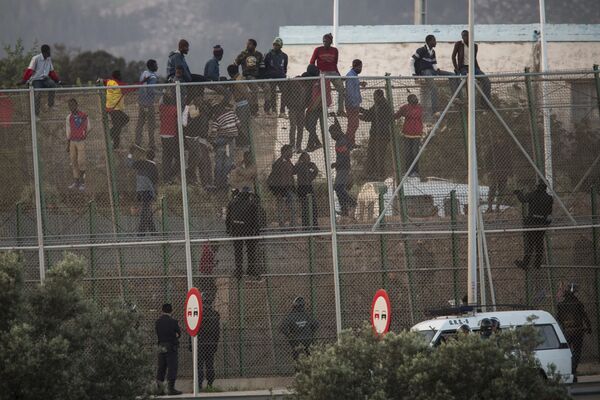
"The issue is complicated by the fact that the Sahara is not a decolonised territory; the decolonisation process is paralysed because Morocco doesn't accept the census results for a self-determination referendum. Until this process is over, Morocco won't be able to use the maritime territories of the future state the Sahara could become. However, Rabat has already unilaterally delimited the borders and even wants to carry out geological exploration activities in this area", the expert stressed.
'Acknowledging Greek Claims Threatens Turkish Sovereignty'
Guy Burton, an expert at the Centre for Middle Eastern Studies at the London School of Economics, believes that the existing Greek-Turkish problem is due to the lack of common ground regarding the principles of delimiting the Mediterranean maritime space.
"Since Turkey hasn't signed the UN Convention on the Law of the Sea, it says that this document is not binding for it and there is no need to recognise Greek borders. Greek islands located 12 to 200 miles from Turkey play an important role in Turkey’s position. Turkey’s acknowledging Greek claims will threaten the country’s sovereignty", Burton explained.
'Greece's Illegal Demands Contradict Not Only Turkey's Practice But Also That of the EU States'
In turn, Gözde Kılıç Yaşın, Head of the Balkans and Cyprus Research Centre at 21st Century Turkey Institute, stressed that the disagreements between the two states are based on “Greece’s illegal claims, which contradict not only Turkey’s interests but also the legal practices of European states:
"The basis of the Eastern Mediterranean crisis was laid both by Greek administration of Cyprus unilaterally proclaiming a special economic zone and issuing licences to explore natural gas to international companies, as well as Greece's recognition of the islands of Crete, Rhodes and Kastelorizo as the country's external borders and its desire to create a special economic zone based on these boundaries. Greece’s intention to outline its external border along the line of the most remote islands is unprecedented in international law."
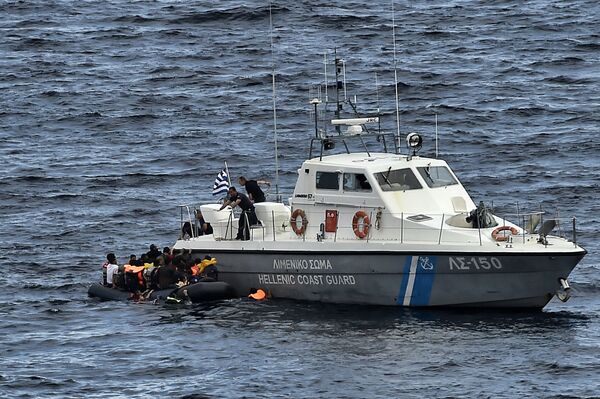
"Of course, claims to the area on Turkey's continental shelf first of all concern Turkey and directly affect its interests. However, Greece's demands also contradict the practices of its EU partners, such as Spain. Greece's claims to these islands are not recognised by the countries it borders on at seas, such as Albania, Libya and Italy", Yaşın stressed.
Speaking about the legal aspect of the issue, Yaşın noted that "the international court's decision on similar cases is to limit jurisdiction over the islands located close to the coastline of another country".
In other words, the international court's practice implies transforming the islands of Rhodes, Crete and Kastelorizo into enclaves, preserving maritime jurisdiction within the territorial waters. According to a similar court decision, the English islands located closer to the French coast are also enclaves.
In all similar cases, the court or the arbitration commission gave preference to the mainland state; this decision falls under the so-called "geographical superiority principle".
"Similarly, in the disputes over Kastelorizo, Turkey's position also coincides with that of Spain and Italy in determining their maritime boundaries, as well as with the principles set forth in international courts and arbitration commissions’ decisions. In this context, Greece’s claiming the existence of a maritime border with Egypt seems to be controversial. Here we are not talking about law, but about politics. Therefore, if this issue is considered in court de rigore juris, the decision made will coincide with Turkey's position", Yaşın pointed out.
In conclusion, Yaşın recalled that in 2003 Greece asked Turkey for permission to conduct exploration south of Kastelorizo, which meant the recognition of Turkey's sovereign rights:
"The position of the interested states plays an important role in forming a legal precedent. On 26 March 2003, Greece asked Turkey for permission to carry out exploration south of Kastelorizo, which actually meant Greece’s recognition of the Turkish continental shelf. A similar role is played by the precedent when the German research vessel R/V Meteor, owned by the University of Hamburg, asked Turkey for permission to carry out research in the Aegean Sea, in the waters around the island of Lemnos, which Greece considers "its continental waters".
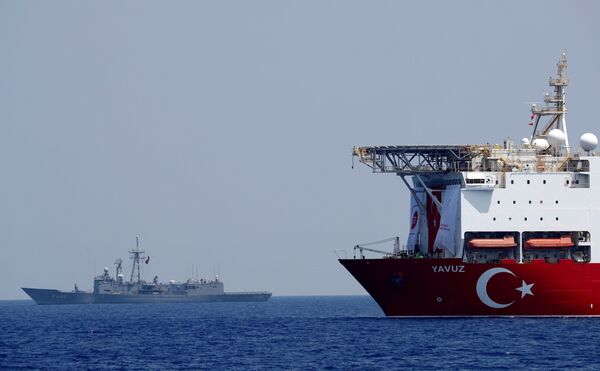
"Another German exploration vessel, Maria S. Merian, also asked Turkey's permission to carry out exploration activities, to which Turkey responded positively by issuing a NAVTEX alert in the area between Crete and Cyprus, 580 kilometres long and 25 kilometres wide. All these precedents show that Turkey’s sovereign rights are recognised in this region", she concluded.
